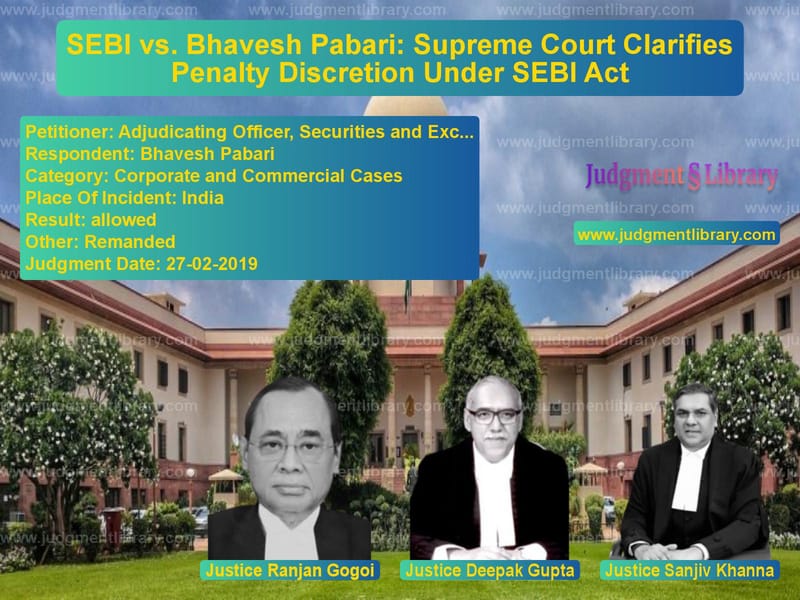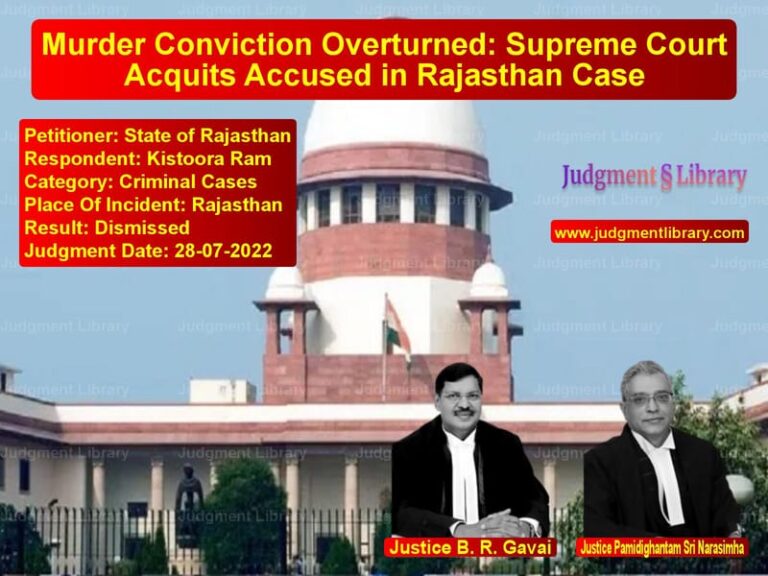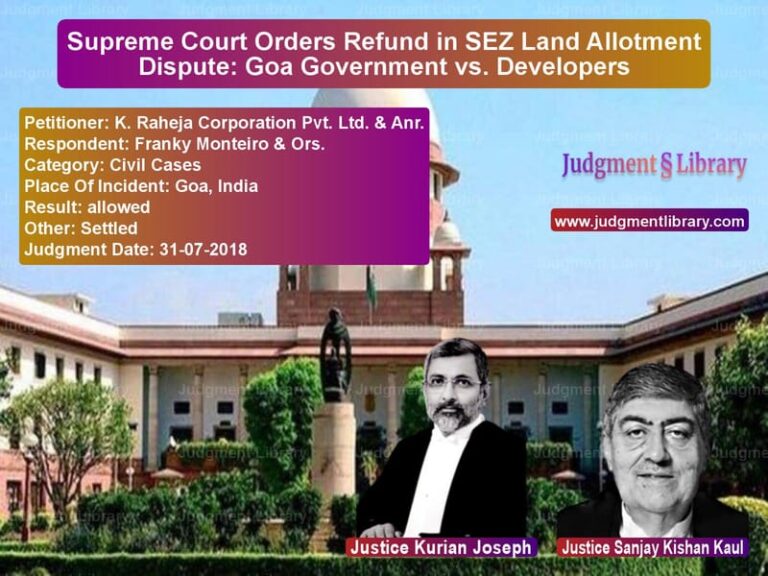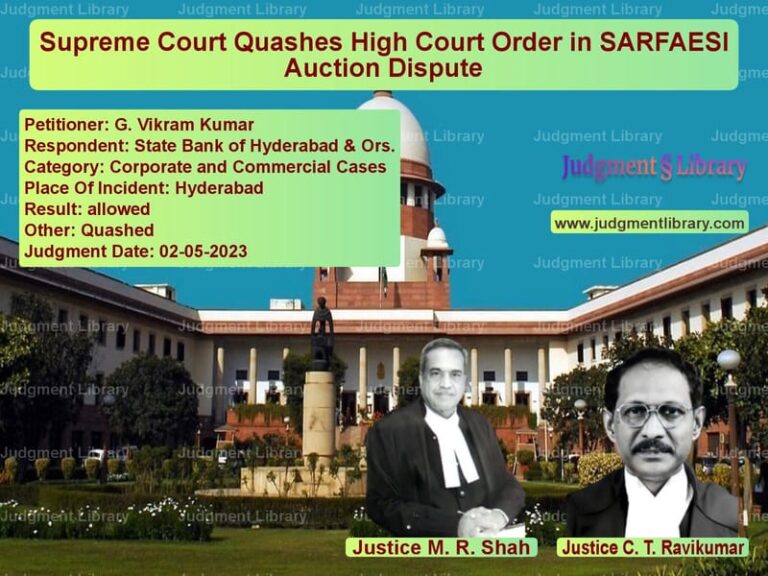SEBI vs. Bhavesh Pabari: Supreme Court Clarifies Penalty Discretion Under SEBI Act
The case of Adjudicating Officer, Securities and Exchange Board of India vs. Bhavesh Pabari revolves around the imposition of penalties under the SEBI Act and the discretion of the adjudicating officer in determining the quantum of penalties. This Supreme Court judgment clarifies whether the conditions stipulated in Section 15-J of the SEBI Act are exhaustive or merely illustrative and whether Section 15-J is overridden by the penalty provisions under Sections 15-A to 15-HA of the Act.
Background of the Case
The Securities and Exchange Board of India (SEBI) was established to protect investors and regulate the securities market. Under the SEBI Act, various penalty provisions exist for violations of market regulations. The dispute in this case primarily revolved around the interpretation of these provisions.
SEBI had imposed penalties on multiple individuals, including Bhavesh Pabari, for violations related to fraudulent and unfair trade practices in securities trading. These penalties were challenged in court, leading to a broader discussion on the discretion available to the adjudicating officer while determining the quantum of penalties.
Key Legal Issues
The Supreme Court considered two major questions:
- Are the conditions in Section 15-J of the SEBI Act exhaustive, or do they serve only as guidance in determining penalties?
- Does Section 15-J override or get nullified by Sections 15-A to 15-HA, which prescribe specific penalties?
Arguments Presented
Petitioner’s Arguments (SEBI)
SEBI contended that:
- The penalty provisions under Sections 15-A to 15-HA prescribe minimum penalties that must be imposed, leaving no room for discretion under Section 15-J.
- The adjudicating officer’s role is limited to applying these penalties as per the SEBI Act without considering mitigating factors.
- Sections 15-A to 15-HA, being specific provisions, should override the general discretion under Section 15-J.
Respondent’s Arguments (Bhavesh Pabari and Others)
The respondents argued that:
- Section 15-J provides essential discretion to the adjudicating officer in determining penalties.
- If SEBI’s view were accepted, it would lead to excessively harsh penalties even for minor or technical violations.
- Past Supreme Court judgments, including SEBI vs. Roofit Industries Ltd., incorrectly held that Section 15-J was overridden by Sections 15-A to 15-HA.
- The legislature, by adding an explanation to Section 15-J in 2017, had clarified that the adjudicating officer always had the discretion to consider mitigating factors.
Supreme Court’s Observations
The Supreme Court analyzed the legislative intent and the purpose of the SEBI Act. It noted that:
- Section 15-J serves as a guiding provision for adjudicating officers, helping them assess penalties based on the nature of violations.
- Sections 15-A to 15-HA should not be read in isolation but must be harmonized with Section 15-J.
- The explanation added to Section 15-J in 2017 confirmed that discretion was always intended to be available to adjudicating officers.
- A rigid interpretation of the penalty provisions would lead to disproportionately high penalties for minor infractions, which was never the legislature’s intent.
The Court stated:
“The power of an adjudicating officer to adjudge the quantum of penalty under Sections 15-A to 15-HA shall always be deemed to have been exercised under the provisions of Section 15-J.”
Final Judgment
The Supreme Court held that:
- Section 15-J is not overridden by Sections 15-A to 15-HA. Instead, it must be read alongside these provisions.
- Adjudicating officers have the discretion to consider mitigating factors while imposing penalties.
- Past interpretations that nullified Section 15-J’s discretion were incorrect and must be disregarded.
- The penalty imposed on the respondents should be reconsidered by the adjudicating authority, taking into account mitigating circumstances.
Legal Implications of the Judgment
This ruling has significant implications for securities regulation and enforcement. It ensures that:
- Adjudicating officers retain the flexibility to impose fair and proportional penalties.
- Minor violations do not attract disproportionately harsh penalties.
- Market participants receive penalties based on the actual impact of their actions rather than a rigid formula.
Conclusion
The Supreme Court’s judgment in SEBI vs. Bhavesh Pabari clarifies the balance between fixed penalty provisions and discretionary powers. By reinforcing the role of Section 15-J, the ruling ensures that adjudicating officers can exercise reasonable judgment in imposing penalties. This decision provides much-needed clarity for future SEBI enforcement actions and upholds the principle of proportionality in regulatory penalties.
Petitioner Name: Adjudicating Officer, Securities and Exchange Board of India.Respondent Name: Bhavesh Pabari.Judgment By: Justice Ranjan Gogoi, Justice Deepak Gupta, Justice Sanjiv Khanna.Place Of Incident: India.Judgment Date: 27-02-2019.
Don’t miss out on the full details! Download the complete judgment in PDF format below and gain valuable insights instantly!
Download Judgment: Adjudicating Officer vs Bhavesh Pabari Supreme Court of India Judgment Dated 27-02-2019.pdf
Direct Downlaod Judgment: Direct downlaod this Judgment
See all petitions in Corporate Compliance
See all petitions in unfair trade practices
See all petitions in Judgment by Ranjan Gogoi
See all petitions in Judgment by Deepak Gupta
See all petitions in Judgment by Sanjiv Khanna
See all petitions in allowed
See all petitions in Remanded
See all petitions in supreme court of India judgments February 2019
See all petitions in 2019 judgments
See all posts in Corporate and Commercial Cases Category
See all allowed petitions in Corporate and Commercial Cases Category
See all Dismissed petitions in Corporate and Commercial Cases Category
See all partially allowed petitions in Corporate and Commercial Cases Category







